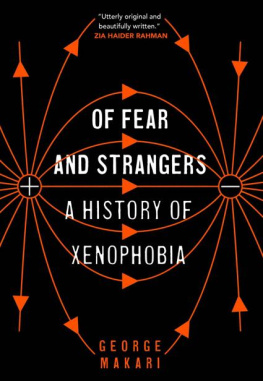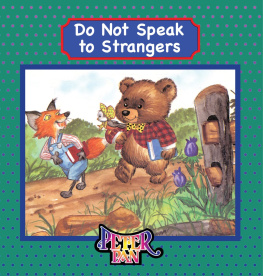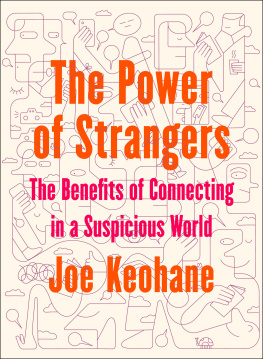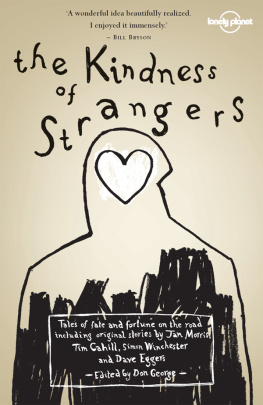George Makari - Of Fear and Strangers
Here you can read online George Makari - Of Fear and Strangers full text of the book (entire story) in english for free. Download pdf and epub, get meaning, cover and reviews about this ebook. year: 2021, publisher: Yale University Press, genre: Religion. Description of the work, (preface) as well as reviews are available. Best literature library LitArk.com created for fans of good reading and offers a wide selection of genres:
Romance novel
Science fiction
Adventure
Detective
Science
History
Home and family
Prose
Art
Politics
Computer
Non-fiction
Religion
Business
Children
Humor
Choose a favorite category and find really read worthwhile books. Enjoy immersion in the world of imagination, feel the emotions of the characters or learn something new for yourself, make an fascinating discovery.
- Book:Of Fear and Strangers
- Author:
- Publisher:Yale University Press
- Genre:
- Year:2021
- Rating:3 / 5
- Favourites:Add to favourites
- Your mark:
- 60
- 1
- 2
- 3
- 4
- 5
Of Fear and Strangers: summary, description and annotation
We offer to read an annotation, description, summary or preface (depends on what the author of the book "Of Fear and Strangers" wrote himself). If you haven't found the necessary information about the book — write in the comments, we will try to find it.
Of Fear and Strangers — read online for free the complete book (whole text) full work
Below is the text of the book, divided by pages. System saving the place of the last page read, allows you to conveniently read the book "Of Fear and Strangers" online for free, without having to search again every time where you left off. Put a bookmark, and you can go to the page where you finished reading at any time.
Font size:
Interval:
Bookmark:
OF FEAR AND STRANGERS
ALSO BY GEORGE MAKARI
Soul Machine: The Invention of the Modern Mind
Revolution in Mind: The Creation of Psychoanalysis

Excerpt from Sphere: The Form of Motion by A. R. Ammons. Copyright 1974 by A. R. Ammons. Used by permission of W. W. Norton & Company, Inc.
Copyright 2021 George Makari
All rights reserved. This book may not be reproduced in whole or in part, in any form (beyond that copying permitted by Sections 107 and 108 of the U.S. Copyright Law and except by reviewers for the public press) without written permission from the publishers.
For information about this and other Yale University Press publications, please contact:
U.S. Office:
Europe Office:
Printed in Great Britain by TJ Books, Padstow, Cornwall
e-ISBN 978-0-300-26281-0
A catalogue record for this book is available from the British Library.
10 9 8 7 6 5 4 3 2 1
F OR A RABELLA
CONTENTS
PROLOGUE: OUT OF BEIRUT
IT MAY SEEM LAUGHABLE , but for the longest time I didnt realize how much this story entwined with my own. I dont think of myself as assimilated, because I suppose I am. I have never uttered, I am the child of immigrants. Even writing those words is jarring. It reeks of need and feels false, for I rarely see myself that way anymore. Foreigners kid? After such an admission, well-oiled reflexes urge me to rattle off a list of my hometown allegiances and virtues. My parents, like many immigrants, became experts at such, often mortifying, flag-waving. And yet long after becoming American citizens, they persisted in the unspoken knowledge that all those fancy degrees and citations could, poof, like a broken spell, turn into swirling taunts and mockery, Harvard undone by a funny accent.
All that was far from my mind when I traveled to London in late May of 2016. I had come to promote my new book. Unbeknownst to me, the country was about to vote on leaving the European Union. I was clueless. Nigel Farage? Never heard of him. In a sweater shop near the British Museum, the clerk talked excitedly about protecting Britain from an impending invasion of Turks. Weird, I thought. Something else, however, was much on my mind; I was scheduled to meet with my literary agent who surely would ask about my next project. Fully spent from the last marathon, I had no plan, no ideas, nothing. Sarah asked. A cheerful assistant eagerly readied to take notes. I babbled, mumbling something about the other mind problem, how we mistakenly imagine each other. I might have mentioned cyborgs. It was embarrassing. I returned to New York, and soon thereafter the United Kingdom voted to leave the European Union. A few months later, the United States elected a new president, Xenophobia. It sounded vaguely other mind-y and psychiatric. A psychiatrist myself, I decided to look into it.
The beginning of the story, I assumed, would be as old as humankind. Ever since our first ancestors emerged on the eastern plains of Africa, humans have been on the move. A migratory species, Homo sapiens would settle in one place, then, due to fear, enemies, drought, famine, pestilence, or some wild hope over the horizon, move on. While craving home, a stable and predictable resting place swaddled in memory and meaning, we have always been compelled to go. From Adam and Eves expulsion to the defeated warriors of Troy or the lost Hopi tribes far from their mesas, our myths speak of those who voyage forth from a blessed place, unsure of their next resting place. Once dusty layers of forgetting are swept away, who does not descend from such a journey? Whether it was last week in a dinghy or centuries ago alongside a regal army, whether bound in chains or draped in silk, havent we all at some point settled as wide-eyed aliens in a swarming, foreign place?
Once these wanderers docked or crossed over those hills, they eventually stumbled upon others who had preceded them. Stranger and stranger came face-to-face. Those who were already established usually had the upper hand. Still, they wondered if these foreigners had come in malice. Will they wrest from us what is ours? Will we become strangers in our own land? Walls were constructed for such fears; barriers of less visible sorts, too.
Such uneasy encounters must be as ancient as our species. And so, when colleagues discovered I was working on a history of xenophobia, they were befuddled. How could I write a history of fears that seemed intrinsic to all time? It seemed Quixotic, Borgesian, like writing a universal chronicle of laughter. Our earliest written records indicate that in many civilizations, strangers were broadly conceived of as objects of fear and mistrust. Some have gone so far as to speculate that, for primal man, all strangers were de facto enemies. In a number of languages, the words for stranger and enemy are the same. Xenophobia, then, one might conclude, is an everlasting trouble, bred deep in the human heart. As such, any history .
Of Fear and Strangers is not that. It does not seek to record all those mistreated, enslaved, or slaughtered in ways we might today call xenophobic. Rather, it is an account of another history that lay hidden in this word. Who, I began to wonder, first deemed such reactions phobicthat is, irrational and mistaken? How and where was there an awakening of conscience by which some proclaimed it unreasonable to mistreat strangers? How did those voices create an ethic by which such behavior was gradually deemed worthy of censure? And how did varied concepts emerge to account for such dangerous attitudes?
In 2016 when I typed x-e-n ... into my search engine, nothing popped up that might help with those questions. There was a definitionthe fear and hatred of strangersbut, unlike anti-Semitism or racism or homophobia, xenophobia seemed to have no history. Take a look. All you will find are passing, vague references to Greek antiquity, not much else. This erasure led some to conclude that the notion itself was empty, little more than an accusation wrapped around thin air. For policy makers, the word seemed to be an abstract synonym for specific forms of discrimination, each better defined by the target of their hatred, be it based on race, religion, ethnicity, gender, sexuality, or class. Since each of these scourges possessed profound histories, there would be no benefit in adding an abstraction like xenophobia to the sorry list.
This dismissal, I have come to believe, is mistaken. Firstly, xenophobia is categorically different. In speaking of anti-Semitism or Islamophobia or homophobia, we name the maligned group, while those who do the discriminating remain otherwise undefined, unknown in and of themselves. Xenophobia corrects that imbalance and directs our attention to the source of the trouble, thereby opening up a critical line of inquiry. For, as a century of thinkers from Josiah Royce to James Baldwin have noted, our language has too often unwittingly implied that the nature of the trouble lay within the defining qualities of the problem group. What if Americas social strife, Royce asked in 1908, was better defined not by reference to a black peril or a yellow peril but rather by the presence of a white peril?
Of Fear and Strangers tells of a series of attempts to isolate, define, investigate, and answer that question. Our story commences with a burst of invention and the terms shocking rise, followed by a radical reorientation, and an expansion that gave the word its post-1945 ethical and political connotations. As we shall see, xenophobia emerged in French and English, tied to formative Western debates over nationalism, globalization, race, and immigration. As such,
Next pageFont size:
Interval:
Bookmark:
Similar books «Of Fear and Strangers»
Look at similar books to Of Fear and Strangers. We have selected literature similar in name and meaning in the hope of providing readers with more options to find new, interesting, not yet read works.
Discussion, reviews of the book Of Fear and Strangers and just readers' own opinions. Leave your comments, write what you think about the work, its meaning or the main characters. Specify what exactly you liked and what you didn't like, and why you think so.








